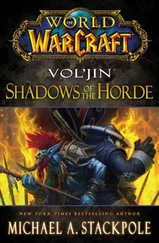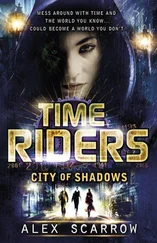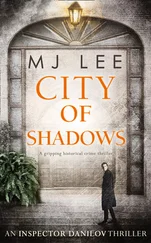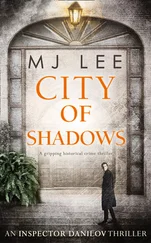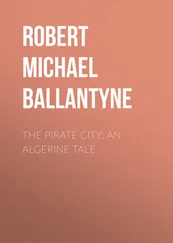Michael Russell - The City of Shadows
Здесь есть возможность читать онлайн «Michael Russell - The City of Shadows» — ознакомительный отрывок электронной книги совершенно бесплатно, а после прочтения отрывка купить полную версию. В некоторых случаях можно слушать аудио, скачать через торрент в формате fb2 и присутствует краткое содержание. Жанр: Исторический детектив, на английском языке. Описание произведения, (предисловие) а так же отзывы посетителей доступны на портале библиотеки ЛибКат.
- Название:The City of Shadows
- Автор:
- Жанр:
- Год:неизвестен
- ISBN:нет данных
- Рейтинг книги:5 / 5. Голосов: 1
-
Избранное:Добавить в избранное
- Отзывы:
-
Ваша оценка:
- 100
- 1
- 2
- 3
- 4
- 5
The City of Shadows: краткое содержание, описание и аннотация
Предлагаем к чтению аннотацию, описание, краткое содержание или предисловие (зависит от того, что написал сам автор книги «The City of Shadows»). Если вы не нашли необходимую информацию о книге — напишите в комментариях, мы постараемся отыскать её.
The City of Shadows — читать онлайн ознакомительный отрывок
Ниже представлен текст книги, разбитый по страницам. Система сохранения места последней прочитанной страницы, позволяет с удобством читать онлайн бесплатно книгу «The City of Shadows», без необходимости каждый раз заново искать на чём Вы остановились. Поставьте закладку, и сможете в любой момент перейти на страницу, на которой закончили чтение.
Интервал:
Закладка:
Vincent had been watching a group of stewards and workmen as they struggled to unload a trailer of heavy benches in front of the high altar. People were already being moved back from the areas reserved for the great and the good. They would have no need to arrive before dawn and stand there all morning. He spoke to the big man who was so cheerfully in charge.
‘Is there anything I can do to help?’
‘There’s still benches to be shifted. We can’t have the bigwigs standing up, not when they’ve brought their arses with them to sit on.’
He worked through the morning, carrying benches and chairs and lining them up in rows. He brought plants and flowers to the colonnades of the high altar. He fetched kettles of tea for the stewards and the labourers, and he picked up their litter. The more he worked, the more he let himself sink into a sense of belonging that was utterly unfamiliar to him. The Eucharistic Congress had seemed a long way from him a week ago, even though it was the only thing anybody was talking about. It filled Dublin and Ireland and the hearts and minds of everyone in it. But it had had nothing to do with him until now, except as the chink of light that offered him a way to find the man he loved. Now it felt different. He didn’t forget why he was there, not for a moment, but he hadn’t expected to be absorbed into the day like this. Suddenly it was his day too. He had contributed his sweat to it. And when the work was done and a hush of anticipation descended on the Phoenix Park, the steward he’d first spoken to slapped him on the back.
‘You may stay at the front, lad. You’ve done more than your share.’
The cavalry came first, lances held high, escorting the carriages and the cars that brought the world’s cardinals, archbishops and bishops to the high altar. They were followed by politicians and ambassadors in tails and top hats, businessmen and union leaders, and the banners of almost every society, association and club in Ireland that could come up with a halfway decent reason to be there. They were led by the graciously waving hand of Eamon de Valera. Ten years ago he had gone to war with the independent Irish state he helped wrest from British rule, because it wasn’t independent enough. Then, if some of the Irishmen he had fought beside against the British had caught him, he would have been shot. He had been excommunicated by the Church during the Civil War that followed the War of Independence, when old comrades killed one another because of the six counties that remained under British rule, and an oath to the English king that no one took any notice of, even in London. But now Dev had returned triumphantly from the political wilderness. Now he was the president of the Free State he despised.
Meanwhile a purple and crimson thread of prelates made its way through the thousands of robed priests in front of the altar. For seconds it was so quiet that the birds could be heard singing in the trees; there was the cry of a solitary gull sailing overhead. Cardinal Lauri, the Papal Legate, read the Pope’s words to the crowd. ‘Go to Ireland in my name and say to the good people assembled there that the Holy Father loves Ireland and sends to its inhabitants and visitors not the usual apostolic blessing but a very special all-embracing one.’ And as the Mass started Vincent simply walked to where he wanted to be, where he had to be. ‘Introibo ad altare deo.’ I shall go unto the altar of the Lord. He answered the Cardinal’s words with words he had not spoken in many years. ‘Ad Deum qui laetificat iuventutem meam.’ To God who giveth joy to my youth. Once he had spoken those words as an altar boy. But slowly, painfully, not even understanding why at first, he had seen all the words he knew by heart come to feel like someone else’s. They couldn’t belong to him any more, and worse he couldn’t belong to them. But today they were his again. He held them close, like childhood friends. He hadn’t understood how much he wanted them to be his again.
There were moments in the Mass when he felt the happiness of a childhood that had been ripped away from him by his consciousness of who he was. Was it really impossible to find a way back when he could feel like this? Suddenly he realised that the time had come. The Cardinal had elevated the host that brought Christ’s presence into the life of every one of the million men, women and children now on their knees. Three thousand priests moved out into the crowd with the Eucharist. And for the first time that day, there was doubt in Vincent’s mind. He had still not seen him. He had looked and looked, hoping, believing. Only now did he feel fear, a growing fear that despite everything the priest was not there, that something had happened, that he was lost in a crowd that was a quarter of the population of Ireland.
But then he saw him, shockingly close, moving forward with the chalice, along the line of kneeling figures towards him, just as the passionate voice of John McCormack soared up from the high altar, where he stood in the red and gold and black velvet tunic of a Papal Count. ‘Panis Angelicus.’ Bread of Angels. The bread of angels becomes the bread of man. O miracle of miracles. The priest was too absorbed in what he was doing, too full of the sanctity of the moment, even to see anyone he served the host to; each kneeling form, hands clasped in prayer, each tongue protruding to take the bread of the angels. And it was almost as the priest reached him that Vincent took the note from his pocket. ‘I will wait for you after. I will wait for you. Vincent.’ He had written more at first, much more, over and over again, but each time he had thrown the note away. There would be time to say all that. And there would be ways to say it without any words. He was shaking now as the priest stood in front of him. ‘O res mirabilis!’ As the host left his lover’s hand and rested on his tongue, Vincent pushed the tightly folded note at him. The man stared down. It was a look first of nothing more than broken concentration and surprise, but it was followed by confusion, and then fear.
The kneeling figure looked up at the priest with an expression of almost beatific devotion. The moment lasted only seconds, though for both men it seemed much longer. For Vincent it was as if the million people in the Park were no longer there. For the priest it felt as if a million pairs of eyes were looking into his soul, horrified by what was there. He moved on abruptly to offer the host to the next communicant. Vincent closed his eyes in a prayer of thanks. He had seen neither the confusion nor the fear on his lover’s face. He hadn’t seen the tightly folded note, screwed instantly into an even tighter ball, fall to the ground to be trodden underfoot, unread. And as the Mass ended and a million people went in peace, Vincent Walsh simply sat and watched them go — the people, the cars, the carriages, the politicians, the priests and the prelates. He watched until the stewards and soldiers and policemen were leaving too. He watched until long after he knew that his faith in that day was not going to be fulfilled, until long after all the hope that he had shared with a million people that day had drained away.
There was darkness in the sky now. The policeman had been eyeing him on and off for over an hour. He walked towards Vincent with a look of distaste.
‘It’s time you were away from here.’
‘I was waiting for someone.’
‘I don’t see anyone left to wait for. You heard what I said. Off.’
‘He still might — ’
Vincent stopped. The world he had forgotten about since the early hours of that morning, looking down at the shimmering, moonlit waters of the Liffey, the world he really lived in, the world in which he was a permanent and unwanted stranger, was there in front of him again. Even those words, ‘He still might — ’, said in the way he’d said them, were enough. This guard he had never seen before already knew him. The expression of contempt and disgust was palpable, already like a punch, like the real punches that had so often come with that look in the past. It wouldn’t be the first time they had come from the police officers of the Garda Siochana.
Читать дальшеИнтервал:
Закладка:
Похожие книги на «The City of Shadows»
Представляем Вашему вниманию похожие книги на «The City of Shadows» списком для выбора. Мы отобрали схожую по названию и смыслу литературу в надежде предоставить читателям больше вариантов отыскать новые, интересные, ещё непрочитанные произведения.
Обсуждение, отзывы о книге «The City of Shadows» и просто собственные мнения читателей. Оставьте ваши комментарии, напишите, что Вы думаете о произведении, его смысле или главных героях. Укажите что конкретно понравилось, а что нет, и почему Вы так считаете.

